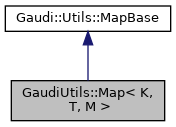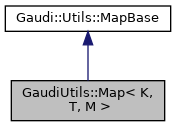|
| | Map ()=default |
| | Standard constructor. More...
|
| |
| | Map (const map_type &other) |
| | Constructor from a standard map. More...
|
| |
| template<typename In > |
| | Map (In &&first, In &&last) |
| | Construct from a subset. More...
|
| |
| virtual | ~Map ()=default |
| | Virtual destructor. You can inherit from this map type. More...
|
| |
| iterator | begin () |
| |
| iterator | end () |
| |
| const_iterator | begin () const |
| |
| const_iterator | end () const |
| |
| mapped_type & | operator[] (const key_type &key) |
| |
| iterator | find (const key_type &key) |
| |
| const_iterator | find (const key_type &key) const |
| |
| size_type | count (const key_type &key) const |
| |
| iterator | lower_bound (const key_type &key) |
| |
| const_iterator | lower_bound (const key_type &key) const |
| |
| iterator | upper_bound (const key_type &key) |
| |
| const_iterator | upper_bound (const key_type &key) const |
| |
| std::pair< iterator, iterator > | equal_range (const key_type &key) |
| |
| std::pair< const_iterator, const_iterator > | equal_range (const key_type &key) const |
| |
| template<class... Args> |
| std::pair< iterator, bool > | emplace (Args &&... args) |
| |
| template<typename ValueType > |
| std::pair< iterator, bool > | insert (ValueType &&val) |
| |
| std::pair< iterator, bool > | insert (value_type &&val) |
| |
| template<typename In > |
| void | insert (In &&first, In &&last) |
| |
| template<typename ValueType > |
| iterator | insert (iterator, ValueType &&val) |
| |
| iterator | erase (const_iterator pos) |
| |
| size_type | erase (const key_type &key) |
| |
| iterator | erase (const_iterator first, const_iterator last) |
| |
| void | clear () |
| |
| size_type | size () const |
| |
| size_type | max_size () const |
| |
| bool | empty () const |
| |
| void | swap (map_type &other) |
| |
| const result_type & | operator() (const argument_type &key) const |
| | Allow to use Map as an unary function. More...
|
| |
| const mapped_type & | operator[] (const key_type &key) const |
| | Access elements of a const Map. More...
|
| |
| const result_type & | at (const argument_type &key) const |
| | checked access to the map More...
|
| |
| Map & | merge (const map_type &other) |
| | Merge two maps. More...
|
| |
| Map & | merge (const Map &other) |
| | Merge two maps. More...
|
| |
| template<class K1 , class K2 , class K3 > |
| Map & | merge (const Map< K1, K2, K3 > &other) |
| | Merge two maps. More...
|
| |
| void | update (const key_type &key, const mapped_type &mapped) |
| |
| | operator map_type & () |
| | Allows to use the Map wherever an std::map is explicitly requested. More...
|
| |
| | operator const map_type & () const |
| |
| const key_type & | key_at (const size_type index) const |
| | useful method for python decoration: More...
|
| |
| const mapped_type & | value_at (const size_type index) const |
| | useful method for python decoration: More...
|
| |
| virtual | ~MapBase () |
| | virtual destructor More...
|
| |
template<typename K, typename T, typename M = std::map<K, T>>
class GaudiUtils::Map< K, T, M >
Extension of the STL map. Provides const accessors and can be extended by inheritance.
- See also
- std::map Note: in order to make it possible to use either a map or a hash_map, reverse iterators are not defined.
Due to helper base class Gaudi::Utils::MapBase, this class is "python-friendly", and one can perform all python manipulaitons in intuitive way:
>>> print
m ## print the
map a
'la python class dict...
>>> for key in m : print key, m[key] ## iteration over the map
...
>>> for key,value in m.iteritems() : print key, value
...
>>> keys = m.keys() ## get the list of keys
>>> values = m.values () ## get the list of values
>> items = m.items () ## get the list of items
>>> if 'one' in m ## check the presence of the key in map
>>> v = m.get(key', None) ##
return m[
key]
for existing
key,
else None
>>> value
m[
key] ## unchecked access through the
key...
- Attention
- The syntax can be drastically simplified, if one redefines the setitem attribute:
>>>
m[
key] = value ## much more intuitive semantics
for key insertion
In a similar way __getitem__ and __delitem__ methods can be redefined.
- Attention
- To avoid the unnesessary expansion of dictionaries it is recommended to exclude from dictionary the following methods:
- lower_bound
- upper_bound
- equal_range
- insert
- Warning
- This action is required for
HashMap to avodi the compilation problems
- See also
- Gaudi::Utils::MapBase
- Author
- Marco Clemencic
- Date
- 2005-10-06
Definition at line 91 of file Map.h.
template<typename K , typename T , typename M = std::map<K, T>>
Allow to use Map as an unary function.
There is no automatic extension of the map for missing keys!
- Attention
- The behaviour is different from std::map
- Parameters
-
- Returns
- the mapped value(const reference!) for the existing key, and the default value overwise
return the default value if not present
Definition at line 228 of file Map.h.




 Public Member Functions inherited from Gaudi::Utils::MapBase
Public Member Functions inherited from Gaudi::Utils::MapBase Protected Member Functions inherited from Gaudi::Utils::MapBase
Protected Member Functions inherited from Gaudi::Utils::MapBase